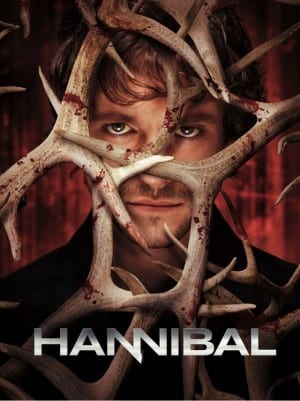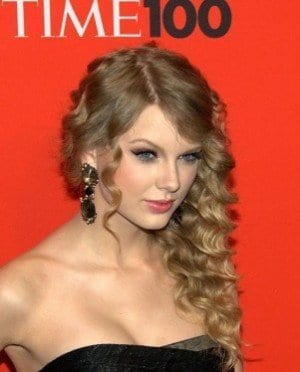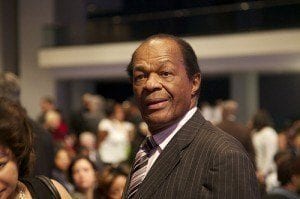
Mea cupla /full disclosure: I started watching NBC’s Hannibal in my periphery. I assumed that it would be the same kind of silly cashing in on a horror franchise that Bates Motel was; this was the ratings-desperate NBC after all. Midway into season 2 I stopped watching Hannibal while I folded my laundry and started paying attention. And what I realized was this: Hannibal is kind of a masterpiece.
In order to do the series justice, I rewatched it in its entirety. I also plunged into the Hannibal novels to see what genius that occurred onscreen that was due to showrunner Bryan Fuller and what was author Thomas Harris’ ideas to begin with. So commenced my Hannibal consumption that took around 2 ½ weeks: 2 seasons of Hannibal, four films (The Silence of the Lambs, Hannibal, Red Dragon, Hannibal Rising and Manhunter) and 3 ¾ books (I read most of Hannibal Rising, but goddamn was it bad.) Throw all of that media together in a crockpot, let it simmer and you get an interesting broth mixture of melodrama, psychology, psychopathy and sexual tension.
What makes Hannibal an amazing piece of TV fiction is that it is a prequel/reboot/homage all wrapped into one – as if Hannibal himself were serving up a turducken (OK, there’s no way in hell Hannibal Lecter would make that, I know.) Here’s some truth for you: prequels pretty much suck. Why do they suck? Because if they were all that interesting to begin with, we would have seen that story in the first place. If The Phantom Menace was so essential, it would’ve come out before A New Hope and we would all live in a different/scarier universe. What makes Hannibal a great prequel is that it’s not one. Sure, it is the early days of Hannibal Lecter’s career as a practicing psychiatrist before he was caught, but it also is a bold step forward making its own path outside of the novels and films while at the same time respecting them. Hannibal eats his victims in a way that honors them; so needless to say, I think he’d dig the analogy.
I had only seen the “original trilogy” of films at least once each, so NBC’s Hannibal was relatively new territory for me the first time around. The second viewing however showed me scores visual references, thematic nods and lines of dialogue ripped from the pages of Thomas Harris’ novels that make the show infinitely richer. There’s a scene in Hannibal’s second season where Will Graham fantasizes about killing a bound Hannibal with a noose-pulley attached to a tree and a stag. This is directly out of Hannibal Rising, which is what makes Bryan Fuller so good at what he does: cannibalizing the parts of the books and putting them to better/different use.
Anyone who has watched any of his past work (Wonderfalls, Dead Like Me, Pushing Daisies) knows that Bryan Fuller is adept at visual arts and metaphor. The visual aesthetic of Hannibal is probably what makes it stand out most from other TV shows. Not only is every serial killer crime scene a carefully thought-out piece of art, but the staging, lighting and motion are as well. Upon reading the novel Hannibal (which, controversially, might be my favorite of the books) it is clear where Fuller pulled his inspiration from. The Hannibal novel is the first (and only?) chapter of the saga that features that dream-like and philosophical aura that Fuller’s show lives and revels in. That fantastic Stephen Hawking tea cup time sequence discussion? That’s right out of Hannibal, where the titular character discusses with Clarice Starling how he yearns for his long-dead sister Mischa to return from the grave. In the show, Will Graham and Abigail Hobbs are replaced, respectively, but the conceit is the same…and it’s awesome nonetheless.
Before I wrap up, allow me to reflect on the films and books I have experienced.
Red Dragon: as a book, it is fairly procedural. Will Graham is kind of boring however, and is portrayed as a moody sonofabitch in Manhunter by William Petersen and white bread by Edward Norton in Bret Ratner’s Red Dragon film. Curiously, this is Will Graham’s first and last outing in the Lecter-verse (until NBC’s Hannibal of course.)
The Silence of the Lambs: more layered and complex than Red Dragon, largely due to the addition and psychological probing Clarice Starling. Certainly the most popular of the novels and films, most likely because of the balancing act it does with show us just enough of Hannibal Lecter that it leaves us wanting for more. In the film, Anthony Hopkins of course kills it with his hungry eyes and devilish charms.
Hannibal: More of a melodramatic game of revenge than a thriller, Hannibal dares to address the nature of Dr. Lecter’s relationship with Starling. While it is most certainly bizarre (in the novel, they end up running off together as philosophical contemporaries/lovers) it is nonetheless fascinating. The novel introduces us to the concept of Hannibal’s “memory palace,” a place in his mind where he returns to, often while confined. The film suffers from cast changes and character omissions, leaving a less satisfactory experience.
Hannibal Rising: Just the worst. Hannibal pealed back the curtain a little bit in the form of Lecter lamenting the childhood death of his sister Mischa. Hannibal Rising decided to expand upon this in the most boring and un-Hannibal-like way imaginable. Taking place mostly in France, we spend and exhausting amount of time with Hannibal tracking down his family paintings, trying to remember how his sister Mischa died and then finding and killing the Nazi scavengers who ate Mischa. Played by Gaspard Uliel in the film, this character is leaps and bounds away from the villainous Lecter that we’ve seen in other media. He’s a different person altogether, fawning over his Japanese Aunt. The prequel ends relatively early in his career, before he even became a practicing psychiatrist, implying that Harris intends to tell more boring stories. (Fun fact: MGM considered Hayden Christensen for the role, which would’ve been his second terrible young bad guy performance.)
NBC’s Hannibal honors all of the adaptations that have come before it and uses them in new and interesting ways. The Starling/Lecter relationship from The Silence of the Lambs and Hannibal has been fully mapped onto the Hugh Dancy and Mads Mikkelsen. Mikkelsen himself plays a Hannibal that is unlike anything that has come before, with a poker face that you try to read through over the entire series. Fuller has even stated that Season 3 will feature Lady Murasaki from Hannibal Rising, who we can only assume will be infinitely more interesting. If you love Hannibal and you can’t wait until 2015 for more from NBC, I’d recommend visiting/re-visiting the films and novels. Just not Hannibal Rising. Never Hannibal Rising.















